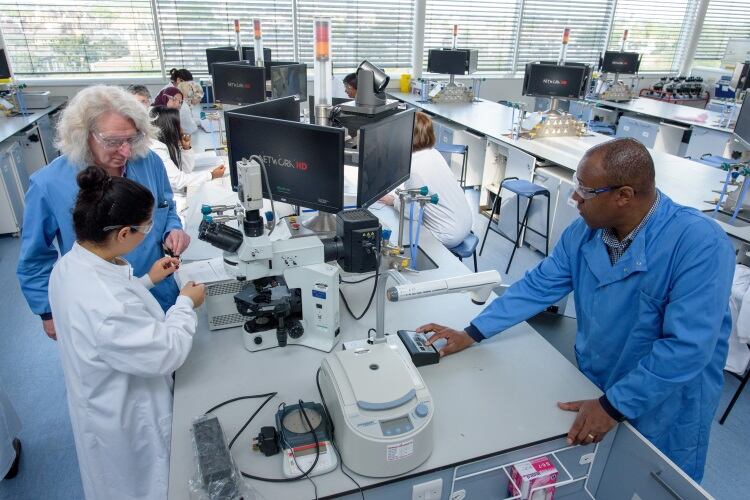At first glance, London Metropolitan University’s flagship master’s degree in food science offers precisely what you would expect from one of the country’s leading education providers.
However, according to course leader Dr Hamid Ghoddusi, the novel attraction of the one-year MSc degree is its connection and involvement with the food industry.
“Looking at any university or college delivering a degree at any level, what employers are expecting to see is the students’ understanding of the industry,” says Ghoddusi.
“By just doing a degree, you don’t get that exposure to the real-life industry experience, and this is missing from many of the programmes delivered by different institutes.”
The Met’s food science degree attempts to tackle this problem by working closely with businesses to develop food industry placements, allowing its students to get the hands-on experience they need. As a result, Ghoddusi says students going into the workplace are much more confident and are finding it easier to secure a job.
Ghoddusi’s claims are backed up by the most recent Destinations of Leavers from Higher Education survey, which showed 100% of all 2017 course graduates were in work or further study within six months.
It’s an impressive outcome, but that doesn’t mean the course isn’t without its challenges. The hands-on approach can only work with the help of organisations willing to give students a chance, and what makes it particularly difficult for the university is its location. London is not known for its abundance of big food and drink manufacturers willing to spend the time needed to nurture new talent.
“Yes, there are many small and medium-sized companies, but these are the ones that are less eager to take on students, because they think they are a burden to them,” suggests Ghoddusi. “To a certain degree they may be correct, but when you look at the whole picture, whatever contribution comes from the industry, the benefit goes back to the industry.
“If you look at the bigger picture as being food science for the country, it’s not unreasonable to ask the industry to contribute more.”
Another module that plays a key part in students’ learning is food product development, which provides them with in-depth knowledge of food production all the way from conception to the final product.
“Sensory analysis, for example, is integral to any food product development, so they learn the knowledge and the skills around that and put it into practice when they develop their own product,” Ghoddusi explains.
Each year, students who take this module submit their projects to the Institute of Food Science and Technology’s student innovation competition, Ecotrophelia. Teams from the food science course have placed in the top three in each of the past two years, taking the bronze prize in 2017 and the silver award this year.
Students on the course also study food safety and quality management, advanced food analysis, food and microbiology safety and scientific microbiology. However, course content is always under review, in order to provide students with the most up-to-date information in the field of food science and generate graduates that can fulfil the needs of the industry, explains Ghoddusi.
“We always keep an eye on market trends,” he says. “We also appreciate feedback from our graduates and the industry contacts we have. Putting all these together makes a great contribution towards what changes we decide to make every few years.
“For example, when GM [genetically-modified] food was a hotter topic than it is now, we introduced a module called food biotechnology into our course. We’ve looked back and realised conversations surrounding this topic have slowed down and there isn’t much interest in bringing GM food into Europe. So we decided to replace this module to reflect what’s more important to the industry.”
It’s this careful consideration of the industry’s needs, as well as keeping a finger on the pulse of food and drink trends, that has led to the introduction of food policy and nutrition modules into its courses. As the industry adapts to consumers’ needs, so too does the university.
A recent development has been the construction of a purpose-built teaching lab, which Ghoddusi claims is the largest of its kind in the Europe – possibly even the world. “The lab is next to the Arsenal football club stadium in Holloway, and I think when the university thought about building it, they looked at the stadium and said ‘that is huge, so let’s build something even bigger!’
“That’s why we ended up having a teaching lab that can accommodate 280 students in one go, each group of them working on a different subject without interfering with each other. It’s got the ‘wow’ factor.”
While such developments at the university have done much to attract the budding food scientists of tomorrow, one demographic on the decline has been overseas students.
The UK had once been attractive to foreign students, but policies introduced by successive governments to curb net immigration figures – including the scrapping of the post-study work visa and an NHS charge for hospital treatment – had turned many of them off, suggests Ghoddusi.
And, much like the rest of the industry, the looming Brexit deadline has created a lot of further unease for food science.
“I’m on the Food Standards Agency Advisory Committee for Social Science and, at the end of each meeting, there is an update on how Brexit is going to affect the industry. Only one line ever seems to emerge – ‘we don’t know’. It really depends on the deal, or lack thereof.”
While the UK’s departure from the EU presents a clear challenge for both businesses and training providers, as the Met example shows, closer collaboration between the two could prove the most effective approach to providing industry with the skilled labour force it so badly needs.




